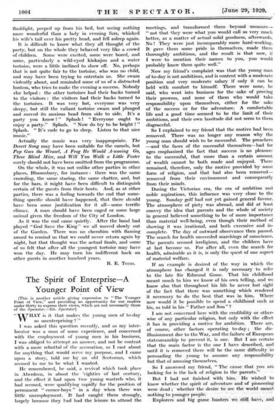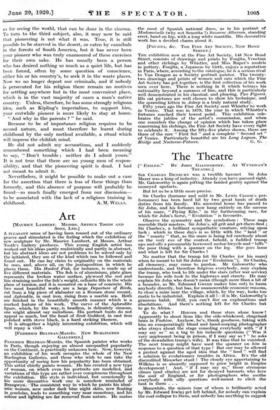The Spirit of Enterprise—A Younger Point of View
This is another article giving expression to " The Younger Point of View," and providing an opportunity for our readers under thirty to express their views, which are not necessarily those of the Spectator.—ED. Spectator] "WHAT is it that makes the young men of to-day so unenterprising ? " I was asked this question recently, and as my inter- locutor was a man of some experience, and concerned with the employment of young men in his business, I was obliged to attempt an answer, and not be content with a mere rebuttal of -the accusation, so I cast about for anything that would serve my purpose, and I came upon a story, told me by an old Scotsman, which seemed to me to be what I wanted.
He remembered, he said, a revival which took place in Aberdeen, in about the 'eighties of last century, and the effect it had upon two young wastrels who, it had seemed, were qualifying rapidly for the position of permanent " corner-boys " in a day when there was little unemployment. It had caught them strongly, largely because they I.-ad had the leisure to attend the meetings, and transformed Ahem beyond -measure- " not that they were what you would call so very much better, as a matter of actual solid goodness, afterwards. No ! They were just incomparably more hard-working. It gave them some pride in themselves, -made them thoroughly ambitious, and the result is that now, if I were to mention their names to you, you would probably know them quite well."
Now my friend's • complaint was that -the young mats of to-day is not ambitious, and is content with a moderate position and very moderate salary if only it can be held with comfort to himself. There were none, he said, who went into business for the sake of proving their prowess, and none of them who would take responsibility upon themselves, either for the sake of the success or for the adventure: A comfortable life and a good time seemed to be the limit of their ambitions, and their own lassitude did not seem to them disgraceful.
So I explained to my friend that the motive had been removed. There was no longer any reason why the young man should wish to be successful. The preachers —and the faces of the successful themselves—had for ages emphasized the fact that success is no pleasure to the successful, that more than a certain amount of wealth cannot be both made and enjoyed. There remained, therefore, only the motive provided by some form of religion, and that had also been removed— removed from their environment and consequently from their minds.
During the Victorian era, the era of ambition and noble aspirations, this influence was very close to the young. Sunday golf had not yet gained general favour. The atmosphere of piety was abroad, and did at least convey the idea that parents and the whole of society in general believed something to be of more importance than material well-being, even though their method of showing it was irrational, and both excessive and in- complete. The day of outward observance then passed. The search for health succeeded searchings of conscience. The parents seemed irreligious, and the children have at last become 'so. For after all, even the search for health, admirable as it is, is only the quest of one aspect of material welfare.
If an example is desired of the way in which the atmosphere has changed it is only necessary to refer to the late Sir Edmund Gosse. That his childhood meant much to him we know of his own telling, and we know also that throughout his life he never lost sight of the fact that there was something which rendered it necessary to- do the 'best that was in him. Where now would it be possible to spend a childhood such as his, as told in his " Father and Son" ?
I am not concerned here with the credibility or other- wise of any particular religion, but only with the effect it has in providing a motive for ambition. There are, of course, other factors operating to-day ; the dis- illusionment due to the. War, and the failure of European statesmanship to prevent it, is one. But I am certain that the main factor is the one I have described, and until it is removed- there will be the same difficulty in persuading the young to assume any responsibility but that of amusing themselves.
So I answered my friend, " The cause that you are looking for is the lack of religion in the parents."
But I had not finished with him. He wished lb know whether the spirit of adventure and of pioneering were dead ; whether the desire to see the world- meant nothing to younger people. Explorers and big game lumters we . still have, and as for seeing the world, that can be done in the cinema. To turn to the third subject, also, it may now be said that pioneering is not what it was. True, it is still possible to be starved in the desert, or eaten by cannibals in the forests of South America, but it has never been your pioneer who was truly enamoured of these exercises for their own sake. He has usually been a person who has desired nothing so much as a quiet life, but has been forced, often by some question of conscience, either his or his country's, to seek it in the waste places. Now we no longer deport our criminals, and if nobody is persecuted for his religion there remain no motives for settling anywhere but in the most convenient place, which is in the vast majority of cases a man's native country. Unless, therefore, he has some strongly religious idea, such as Kipling's imperialism, to support him, your erstwhile pioneer is more likely to stay at home.
" And why in the parents ? " he said.
Because to be of importance religion requires to be second nature, and must therefore be learnt during childhood by the only method available, a ritual which will impress the childish mind.
He did not admit my accusations, and I suddenly remembered something which I had been meaning to say, " Don't trouble ; neither do I admit yours." It is not true that there are no young men of respon- sibility, and that the pioneering spirit is dead. I had not meant to admit it.
Nevertheless, it might -be possible to make out a case for the assertion that there is less of these things than formerly, and this absence of purpose will probably be found—so much finally emerged from our discussion— to be associated with the lack of a religious training in









































 Previous page
Previous page